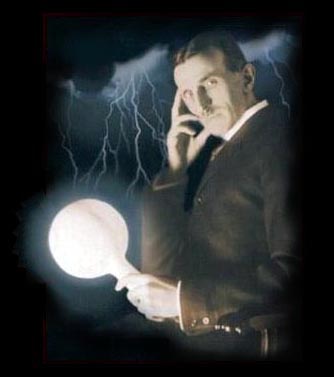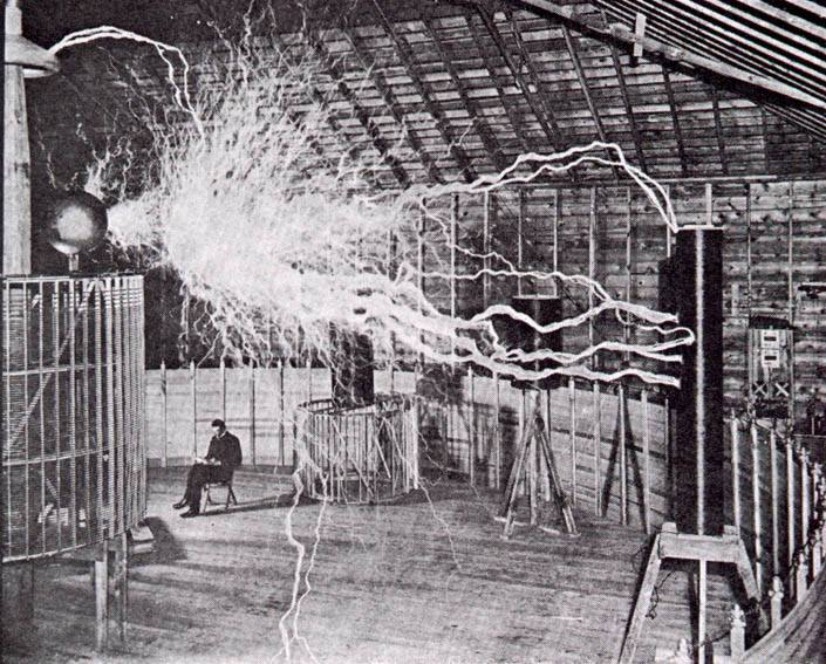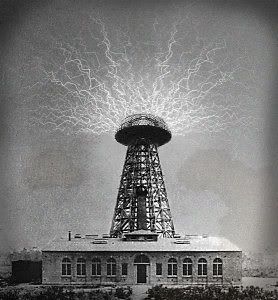 Tesla inherited from his father a deep hatred of war. Throughout his life, he sought a technological way to end warfare. He thought that war could be converted into, "a mere spectacle of machines."
Tesla inherited from his father a deep hatred of war. Throughout his life, he sought a technological way to end warfare. He thought that war could be converted into, "a mere spectacle of machines."In 1931 Tesla announced to reporters at a press conference that he was on the verge of discovering an entirely new source of energy. Asked to explain the nature of the power, he replied, "The idea first came upon me as a tremendous shock... I can only say at this time that it will come from an entirely new and unsuspected source."
War clouds were again darkening Europe. On 11 July 1934 the headline on the front page of the New York Times read, "TESLA, AT 78, BARES NEW 'DEATH BEAM.'" The article reported that the new invention "will send concentrated beams of particles through the free air, of such tremendous energy that they will bring down a fleet of 10,000 enemy airplanes at a distance of 250 miles..." Tesla stated that the death beam would make war impossible by offering every country an "invisible Chinese wall."
 The idea generated considerable interest and controversy. Tesla went immediately to J. P. Morgan, Jr. in search of financing to build a prototype of his invention. Morgan was unconvinced. Tesla also attempted to deal directly with Prime Minister Neville Chamberlain of Great Britain. But when Chamberlain resigned upon discovering that he had been out-maneuvered by Hitler at Munich, interest in Tesla's anti-war weapon eventually collapsed.
The idea generated considerable interest and controversy. Tesla went immediately to J. P. Morgan, Jr. in search of financing to build a prototype of his invention. Morgan was unconvinced. Tesla also attempted to deal directly with Prime Minister Neville Chamberlain of Great Britain. But when Chamberlain resigned upon discovering that he had been out-maneuvered by Hitler at Munich, interest in Tesla's anti-war weapon eventually collapsed.By 1937 it was clear that war would soon break out in Europe. Frustrated in his attempts to generate interest and financing for his "peace beam," he sent an elaborate technical paper, including diagrams, to a number of Allied nations including the United States, Canada, England, France, the Soviet Union, and Yugoslavia. Titled "New Art of Projecting Concentrated Non-Dispersive Energy Through Natural Media," the paper provided the first technical description of what is today called a charged particle beam weapon.
What set Tesla's proposal apart from the usual run of fantasy "death rays" was a unique vacuum chamber with one end open to the atmosphere. Tesla devised a unique vacuum seal by directing a high-velocity air stream at the tip of his gun to maintain "high vacua." The necessary pumping action would be accomplished with a large Tesla turbine.
 Of all the countries to receive Tesla's proposal, the greatest interest came from the Soviet Union. In 1937 Tesla presented a plan to the Amtorg Trading Corporation, an alleged Soviet arms front in New York City. Two years later, in 1939, one stage of the plan was tested in the USSR and Tesla received a check for $25,000.
Of all the countries to receive Tesla's proposal, the greatest interest came from the Soviet Union. In 1937 Tesla presented a plan to the Amtorg Trading Corporation, an alleged Soviet arms front in New York City. Two years later, in 1939, one stage of the plan was tested in the USSR and Tesla received a check for $25,000.Tesla hoped that his invention would be used for purely defensive purposes, and thus would become an anti-war machine. His system required a series of power plants located along a country's coast that would scan the skies in search of enemy aircraft. Since the beam was projected in a straight line, it was only effective for about 200 miles — the distance of the curvature of the earth.
Tesla also contemplated peacetime applications for his particle beam, one being to transmit power without wires over long distances. Another radical notion he proposed was to heat up portions of the upper atmosphere to light the sky at night — a man-made aurora borealis.
Whether Tesla's idea was ever taken seriously is still a mater of conjecture. Most experts today consider his idea infeasible. Though, his death beam bears an uncanny resemblance to the charged-particle beam weapon developed by both the United States and the Soviet Union during the cold war.
Nonetheless, Tesla's dream for a technological means to end war seems as impossible now as it did when he proposed the idea in the 1930s.
1 comment:
I wish I personally met tesla to see his mind at work. But even my parents werent even born when he died.
Post a Comment